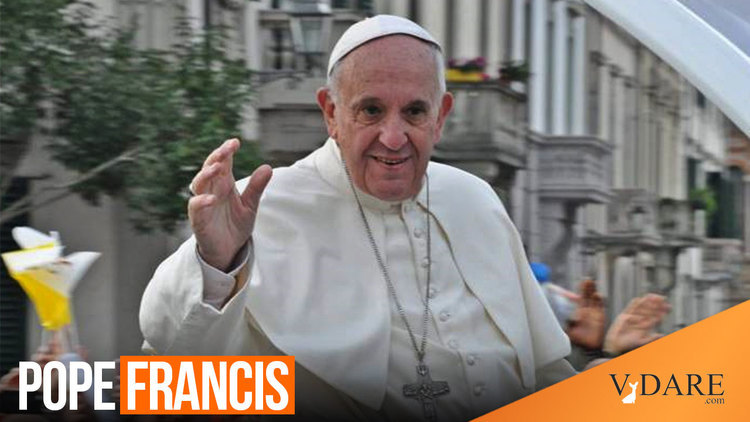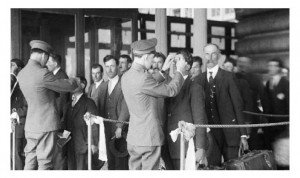


By Allan Wall
02/07/2015
What is the Catholic position on immigration? To judge from the Main Stream Media headlines, the Church demands Open Borders and mass immigration. Indeed, in what would be a cheap and hypocritical stunt, the first Latin American pontiff, Pope Francis, expressed a desire to cross the U.S.-Mexican border.
Speaking to reporters on an airplane, Pope Francis said that “To enter the United States from the border with Mexico would be a beautiful gesture of brotherhood and support for immigrants.”
Pope Francis: Crossing Into U.S. From Mexico Would Be A ‘Beautiful Gesture', By Roque Planas, Huffington Post, January 20, 2015
Of course, such a symbolic crossing would be in a spot carefully selected for maximum publicity, probably with pre-selected illegal aliens as extras in the papal spectacle. It would be a media circus planned to make the U.S. look oppressive and the Pope to look noble.
A more “beautiful gesture” and an authentic display of courage would be for the Pope to go to the Middle East and speak out for persecuted Catholics. But that would not get the kind of worshipful media coverage that His Holiness seems to want. After all, grandstanding on behalf of illegal aliens is now par for the course for many Catholics.
Thus, the real question is whether we can count on the Papacy and the Church to defend Christendom or Western Civilization. Even evangelicals like me recognize the importance of the Church as an institution and to the identity of the West.
A recent issue of Chronicles magazine deals with the issue of immigration largely from a Catholic perspective. It offers some hope that Catholics can be true to their Faith and also to their country.
John Zmirak
Zmirak writes that the individual is part of larger groupings, with the Church in the spiritual realm and the human race and the nation-state in the earthly realm:
All human beings have the same incalculable dignity, value, and fundamental rights; they are not identical or interchangeable. Differences of culture, habit, values, and history are precisely what make the existence of so many nations around the world a delight and a blessing. They also make a nation’s decisions on which newcomers to admit, from which societies and in what numbers, grave and consequential.
Zmirak’s statement about “the existence of so many nations” being a “delight and a blessing” is reminiscent of Solzhenitsyn’s observation that “nations are the wealth of mankind.”
Chronicles Editor Thomas Fleming’s Aliens and Strangers spends a great deal of time discussing the record of Pope Francis. However, he shows that the Catholic Catechism, though somewhat ambiguous, does not mandate Open Borders.
Fleming notes this doesn’t prevent Catholic clergy, from cardinals to priests, from banging the drums for Open Borders. And it results in a curious phenomenon found among both religious and secular globalists:
Tenderhearted humanitarians often seem to find it easier to sympathize with criminals and illegal immigrants than with ordinary hardworking people who wish to hang on to the fruits of their labor, their homes, and the cultural and moral principles that have made it possible for them to rear their children in comparative comfort.
Dr. Fleming is right. We see the same thing in the Republican Party: the GOP elite looks down upon its Middle American base. Unfortunately, as Dr. Fleming reminds us, the modern state (by which we mean the modern First World Western state) will not defend itself.
Aaron Wolfe provides a Protestant perspective in the issue. In an article entitled Tongues of Fire: America’s Phony Religion of Immigration, Wolfe cuts to the essence of the debate that is so often obscured. Wolfe observes that the Church is not the state and that their roles are not the same:
In other words, the United States is not a church. Governments exist to protect their citizens, and a just government should act justly … Governments do not exist to peddle a false religion to the world, to invite the drowning onto the ark, to blend all languages into one. This is not a question of compassion, but of function. A government cannot show compassion by refusing to govern. It certainly cannot do so by harming its own citizens.
This is a critical point. When the Pope and the Catholic hierarchy slam Americans who want to control the border, Americans must respond that virtue does not consist in abandoning responsibility for those an institution is supposed to protect. The same applies when the advocates of Open Borders are “evangelicals” subsidized by George Soros.
If you listen to Open Borders Christians of any denomination, you might get the impression that it’s only on American soil that people can be helped. Ironically, those who equate the United States with the Kingdom of God actually make it harder for both church and state to perform their proper functions. For example, listening to the religious Open Borders fanatics, you’d think there were no governments or churches already existing in Latin America that might be able to provide for their own poor people.
As Wolfe writes:
We used to have a religion in this country, more or less, but from before the beginning, false notions of America-as-God’s-Kingdom led to political subterfuge. Today, the two denominations, Democratic and Republican, battle not over theology but for members. They already agree on the central dogma that government exists to serve them and not to protect the people. But they are Elmer Gantrys and not prophets, and we must not to be taken in by their New Thought evangelism… A first step might be to remember that we are a “we,” and that borders are not evil. Even Heaven has them.
From one Protestant to another: Amen, Aaron.
Now if we could only get Pope Francis to understand that.
American citizen Allan Wall moved back to the U.S.A. in 2008after many years residing in Mexico. Allan’s wife is Mexican, and their two sons are bilingual. In 2005, Allan served a tour of duty in Iraq with the Texas Army National Guard. His VDARE.com articles are archived here; his Mexidata.info articles are archived here; his News With Views columns are archived here; and his website is here.